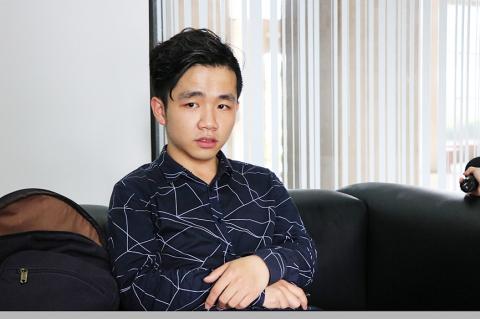A Chinese student in Taiwan who last month spoke out against Chinese President Xi Jinping (習近平) yesterday applied with the National Immigration Agency for long-term residence, saying that he is seeking political asylum.
Li Jiabao (李家寶), 21, said that his visa would expire on July 2 and he does not know whether his application would be accepted, as Taiwan has no asylum or refugee laws or mechanisms in place.
He added that he hopes to stay and finish his studies.

Photo: Wan Yu-chen, Taipei Times
“I am planning to stay in Taiwan for a long time, no matter how difficult life gets here,” he said.
He added that he “will definitely be subject to criminal charges of state subversion” if he returns to China.
Li, from Shandong Province, is enrolled in a short-term program at Chia Nan University of Pharmacy and Science in Tainan.
On March 13, he criticized Xi in a Twitter live stream for removing a presidential two-term limit last year.
With Xi’s move, modern politics in China has become an extension of past autocratic empires, Li said.
When asked whether he still faces financial difficulties after his access to funds from China was cut off following his comments, Li said he has received help from his friends.
Li denied the claim that he criticized Xi in the hope of being allowed to stay in Taiwan, saying that he could have applied for a US visa or sought political asylum in the US.
The Mainland Affairs Council confirmed that Li has also submitted a long-term residence application to the council.
The council said it would consult with government agencies in handling Li’s case, the council said.
Although Taiwan does not yet have a comprehensive refugee management mechanism, given that human rights are a universal value, the government would handle Li’s case properly, taking into consideration international practices, Taiwanese laws, precedents and the protection of human rights, the council said.
Additional reporting by Lu Yin-hsuan

AIR SUPPORT: The Ministry of National Defense thanked the US for the delivery, adding that it was an indicator of the White House’s commitment to the Taiwan Relations Act Deputy Minister of National Defense Po Horng-huei (柏鴻輝) and Representative to the US Alexander Yui on Friday attended a delivery ceremony for the first of Taiwan’s long-awaited 66 F-16C/D Block 70 jets at a Lockheed Martin Corp factory in Greenville, South Carolina. “We are so proud to be the global home of the F-16 and to support Taiwan’s air defense capabilities,” US Representative William Timmons wrote on X, alongside a photograph of Taiwanese and US officials at the event. The F-16C/D Block 70 jets Taiwan ordered have the same capabilities as aircraft that had been upgraded to F-16Vs. The batch of Lockheed Martin

GRIDLOCK: The National Fire Agency’s Special Search and Rescue team is on standby to travel to the countries to help out with the rescue effort A powerful earthquake rocked Myanmar and neighboring Thailand yesterday, killing at least three people in Bangkok and burying dozens when a high-rise building under construction collapsed. Footage shared on social media from Myanmar’s second-largest city showed widespread destruction, raising fears that many were trapped under the rubble or killed. The magnitude 7.7 earthquake, with an epicenter near Mandalay in Myanmar, struck at midday and was followed by a strong magnitude 6.4 aftershock. The extent of death, injury and destruction — especially in Myanmar, which is embroiled in a civil war and where information is tightly controlled at the best of times —

China's military today said it began joint army, navy and rocket force exercises around Taiwan to "serve as a stern warning and powerful deterrent against Taiwanese independence," calling President William Lai (賴清德) a "parasite." The exercises come after Lai called Beijing a "foreign hostile force" last month. More than 10 Chinese military ships approached close to Taiwan's 24 nautical mile (44.4km) contiguous zone this morning and Taiwan sent its own warships to respond, two senior Taiwanese officials said. Taiwan has not yet detected any live fire by the Chinese military so far, one of the officials said. The drills took place after US Secretary

THUGGISH BEHAVIOR: Encouraging people to report independence supporters is another intimidation tactic that threatens cross-strait peace, the state department said China setting up an online system for reporting “Taiwanese independence” advocates is an “irresponsible and reprehensible” act, a US government spokesperson said on Friday. “China’s call for private individuals to report on alleged ‘persecution or suppression’ by supposed ‘Taiwan independence henchmen and accomplices’ is irresponsible and reprehensible,” an unnamed US Department of State spokesperson told the Central News Agency in an e-mail. The move is part of Beijing’s “intimidation campaign” against Taiwan and its supporters, and is “threatening free speech around the world, destabilizing the Indo-Pacific region, and deliberately eroding the cross-strait status quo,” the spokesperson said. The Chinese Communist Party’s “threats